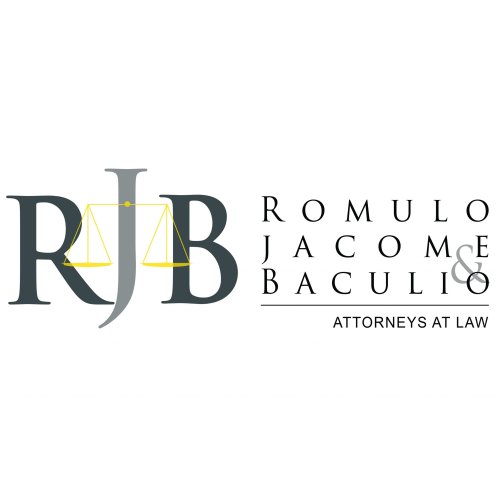Best Natural Resources Lawyers in Manila
Share your needs with us, get contacted by law firms.
Free. Takes 2 min.
List of the best lawyers in Manila, Philippines
About Natural Resources Law in Manila, Philippines
Natural Resources Law in Manila, Philippines, revolves around the regulation and management of the nation's natural resources to ensure sustainable development and environmental protection. Manila, as a bustling urban area, faces unique challenges and opportunities in the management of its natural resources, such as air and water quality, land use, and resource extraction activities. The legal framework aims to balance the needs for economic growth and environmental stewardship, involving various statutes and regulations that govern resource use, conservation, and protection.
Why You May Need a Lawyer
Individuals and businesses may require legal assistance in natural resources for several reasons. This includes applying for permits for resource extraction or development, navigating complex regulations on environmental protection, resolving disputes over land use or resource access, addressing compliance issues with local and national environmental laws, and seeking guidance on environmental impact assessments. Legal expertise is crucial to ensure all activities are compliant with current laws and regulations, potentially preventing costly legal disputes and penalties.
Local Laws Overview
The legal landscape for natural resources in Manila, Philippines, is shaped by several key laws and regulations. The Philippine Constitution declares that all natural resources are owned by the State, and entities wishing to utilize these resources must do so under agreements with the government. The Mining Act, Clean Water Act, Clean Air Act, and other specific environmental legislations dictate how resources must be managed. Moreover, the Environmental Impact Statement System ensures any proposed development undergoes a comprehensive evaluation to mitigate adverse environmental effects. Understanding these laws is paramount for compliance and responsible resource management.
Frequently Asked Questions
1. What are natural resources?
Natural resources refer to materials and components that exist naturally in the environment, such as minerals, forests, water, and land, which can be utilized for economic gain or conservation.
2. Do businesses need permits to utilize natural resources in Manila?
Yes, businesses often require permits or licenses to legally utilize natural resources. This may include permits for mining, water use, land development, and other activities subject to regulatory oversight.
3. How does natural resources law affect landowners?
Landowners in Manila are subject to environmental and natural resources regulations that may dictate how they can use their land, particularly if it involves resource extraction or development that impacts the environment.
4. What is an Environmental Impact Assessment?
An Environmental Impact Assessment (EIA) is a process that evaluates the potential environmental effects of a proposed project or development before it proceeds. It aims to prevent and mitigate negative impacts on the environment.
5. Who enforces natural resources law in Manila?
Various government agencies are responsible for enforcing natural resources law in Manila, including the Department of Environment and Natural Resources (DENR) and local government units.
6. Can individuals engage in mining activities?
Individuals and corporations can engage in mining activities, but they must comply with stringent regulatory requirements, including obtaining relevant permits and adhering to environmental safeguards.
7. Are there penalties for non-compliance with natural resources law?
Yes, there are significant penalties for non-compliance, which can include fines, revocation of permits, and even criminal charges, depending on the severity of the breach.
8. What role do local governments play in managing natural resources?
Local governments are responsible for implementing national policies at a regional level and may have additional regulations and requirements to manage natural resources within their jurisdiction.
9. How does natural resources law affect urban development in Manila?
Natural resources law affects urban development by ensuring projects comply with environmental regulations and assessments, property use restrictions, and sustainable practices to protect natural resources.
10. Can I appeal a decision made by a regulatory body regarding a natural resources issue?
Yes, decisions made by regulatory bodies can typically be appealed. The appeals process usually involves administrative review, and it is advisable to seek legal counsel to navigate these proceedings effectively.
Additional Resources
For individuals seeking more information on natural resources, the Department of Environment and Natural Resources (DENR) is the primary governmental body overseeing environmental regulations. The Environmental Management Bureau (EMB) under the DENR also provides guidance on compliance and environmental quality standards. Additionally, local government offices may offer resources and assistance specific to regional concerns.
Next Steps
If you require legal assistance concerning natural resources in Manila, Philippines, it is recommended to consult with a legal professional specializing in environmental and natural resources law. Lawyers can provide detailed advice tailored to your specific situation, assist in compliance matters, and represent you in disputes or regulatory processes. Begin by researching local law firms with experience in this area, and consider scheduling initial consultations to discuss your needs and explore your legal options.
Lawzana helps you find the best lawyers and law firms in Manila through a curated and pre-screened list of qualified legal professionals. Our platform offers rankings and detailed profiles of attorneys and law firms, allowing you to compare based on practice areas, including Natural Resources, experience, and client feedback.
Each profile includes a description of the firm's areas of practice, client reviews, team members and partners, year of establishment, spoken languages, office locations, contact information, social media presence, and any published articles or resources. Most firms on our platform speak English and are experienced in both local and international legal matters.
Get a quote from top-rated law firms in Manila, Philippines — quickly, securely, and without unnecessary hassle.
Disclaimer:
The information provided on this page is for general informational purposes only and does not constitute legal advice. While we strive to ensure the accuracy and relevance of the content, legal information may change over time, and interpretations of the law can vary. You should always consult with a qualified legal professional for advice specific to your situation.
We disclaim all liability for actions taken or not taken based on the content of this page. If you believe any information is incorrect or outdated, please contact us, and we will review and update it where appropriate.















